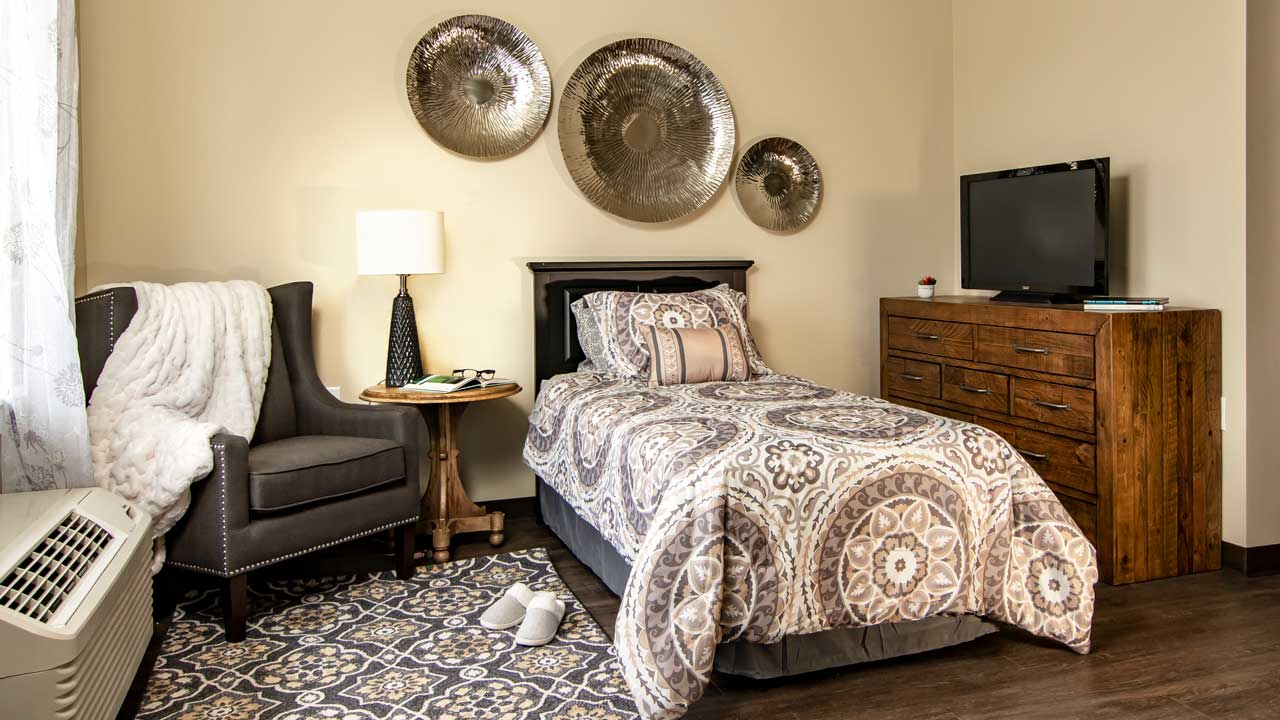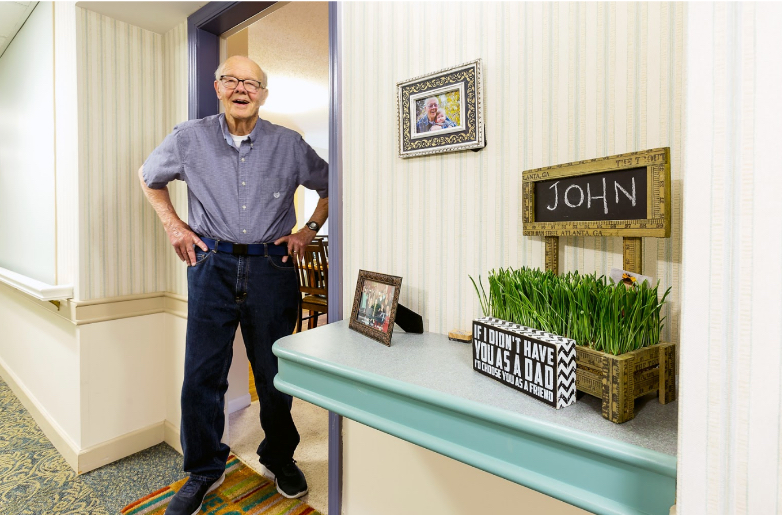Top Reasons to Choose Personalized Memory Care Over Generic Services
Top Reasons to Choose Personalized Memory Care Over Generic Services
Blog Article
All Concerning Memory Care Solutions: Why Small Memory Treatment Houses Are a Great Choice
Memory treatment services play an important function in supporting individuals with Alzheimer's and dementia. Tiny memory treatment homes attract attention for their customized method and intimate setup. With reduced staff-to-resident ratios, these homes foster stronger connections and customized care. Residents gain from enhanced social communications and a secure setting. As families check out alternatives, recognizing the special benefits of small memory care homes comes to be important. What variables should be thought about when picking the best home?
Recognizing Memory Care Services
While several might know with general elderly treatment alternatives, recognizing memory treatment services is vital for households facing the challenges of cognitive decline. Memory care especially caters to people with problems such as Alzheimer's disease and other types of dementia. These services offer a structured setting that concentrates on boosting the high quality of life for locals through specialized care and support.Memory treatment centers are designed to guarantee safety and security and protection, commonly featuring protected environments to stop roaming. Trained personnel are readily available around the clock to help with daily tasks, medicine management, and personal care. Furthermore, memory care programs usually include cognitive stimulation activities, tailored to engage citizens and advertise psychological wellness. Families can gain from recognizing these solutions, as they allow informed decisions regarding their loved ones' care, making sure that their specific requirements and choices are addressed in a compassionate and encouraging manner.
The Benefits of Tiny Memory Care Residences
Little memory care homes supply distinct benefits that can greatly boost the high quality of life for locals with cognitive problems. One substantial benefit is the intimate setting, which enables customized communications among staff and citizens. This smaller setup fosters significant connections, reducing feelings of isolation and anxiety usually experienced by people with memory issues.Additionally, the lower staff-to-resident proportion in tiny memory care homes allows caretakers to supply even more attentive supervision and assistance. This technique not just boosts safety and security yet likewise advertises a feeling of safety and security for the residents.Moreover, little memory treatment homes can adjust swiftly to the special demands and preferences of each citizen, enabling a much more homey environment. Such an atmosphere can motivate social involvement and involvement in activities, inevitably enhancing the day-to-day experiences of those dealing with cognitive disabilities.
Personalized Treatment Plans for Residents
Personalized care plans are crucial in memory care homes, as they deal with the unique requirements and choices of each homeowner. These strategies start with thorough evaluations conducted by experienced experts, who assess cognitive abilities, clinical history, and personal passions. This tailored approach assurances that care is not only effective however also considerate of each individual's dignity and autonomy.Moreover, individualized treatment strategies are versatile, allowing adjustments as homeowners' demands advance with time. This versatility promotes a sense of protection and experience, which is vital for individuals coping with memory obstacles. Caregivers are educated to apply these strategies regularly, giving support that straightens with the citizens' routines and preferences.Ultimately, customized care plans enhance the lifestyle for residents by advertising involvement, wellness, and self-reliance, making them an essential element of memory treatment solutions in small memory care homes.
Creating a Home-Like Setting
Creating a home-like atmosphere is critical for fostering comfort and familiarity in memory treatment settings, as it significantly influences residents' emotional health. Little memory treatment homes commonly focus on individualized touches, such as warm shade schemes, household images, and familiar furnishings plans, which help citizens feel more at simplicity. Integrating elements similar to a conventional home, like cozy living areas and communal locations, motivates a feeling of belonging.Moreover, making use of natural light and exterior spaces can improve the environment, advertising leisure and peace. Employee play a considerable duty in maintaining this atmosphere by engaging with homeowners in a thoughtful fashion, treating them like household. Routine tasks, such as food preparation or gardening, can also add to a home-like feeling, using chances for locals to join meaningful experiences. Overall, creating a nurturing environment sustains cognitive function and psychological security, making it a crucial element of memory treatment solutions.
Boosted Social Communication and Neighborhood
Boosted social interaction and neighborhood are necessary elements of memory treatment services. By cultivating individualized social interaction and creating a family-like environment, these services advertise purposeful connections amongst homeowners. Team events and tasks further urge involvement, assisting people feel more consisted of and supported.
Customized Social Engagement
While social interaction is important for overall wellness, many individuals with memory disabilities typically struggle to involve meaningfully with others. Individualized social interaction in memory treatment homes addresses this obstacle by producing tailored tasks that accommodate citizens' one-of-a-kind rate of interests and capabilities. By concentrating on individual preferences, caretakers can promote connections that reverberate deeply with each person. Tasks such as art treatment, music sessions, and guided discussions promote cognitive stimulation and psychological expression. Additionally, small team settings motivate camaraderie and allow for more intimate communications, boosting sensations of belonging. This approach not just deals with sensations of seclusion however also encourages locals to preserve a feeling of identification, eventually adding to enhanced mental wellness and lifestyle.
Family-like Ambience
In a memory care setup, cultivating a family-like environment greatly enhances social communication and constructs a feeling of area amongst citizens. Smaller sized memory care homes commonly focus on intimate atmospheres, enabling locals to develop closer connections with one another and team member. This nurturing ambience advertises trust fund, which is crucial for individuals with memory disabilities. Citizens are most likely to talk and share experiences, producing a supportive network that reduces sensations of solitude. The familiarity of common rooms and regimens contributes to a sense of belonging, better motivating social communication (personalized memory care). In such setups, emotional bonds prosper, bring about improved general wellness and a higher top quality of life for citizens as they browse their daily experiences with each other
Group Activities and Occasions

Safety And Security and Safety And Security Attributes in Tiny Homes
Lots of tiny homes created for memory care include crucial safety and safety functions to guarantee the well-being of citizens. These homes often utilize protected entry and leave indicate protect against roaming, an usual worry amongst people with memory disabilities. Furthermore, monitoring systems and alarm system mechanisms boost tracking, ensuring that personnel can immediately react to any kind of unusual activities.Interior formats are tailored for safety, with minimized hazards such as sharp edges and clutter-free pathways. Handrails and non-slip floor covering are normally set up to lower the threat of drops. Personnel members are learnt emergency methods, ensuring they are prepared for various situations.Moreover, individualized treatment plans might include evaluation of individual safety requirements, supplying customized services for each and every resident. On the whole, these safety and safety and security features produce a nurturing environment where homeowners can flourish while keeping their dignity and independence.
Exactly how to Pick the Right Memory Care Home
Just how can households assure they choose one of the most appropriate memory care home for their liked ones? The decision needs careful factor to consider of numerous aspects. Households must examine the facility's staff qualifications and training, guaranteeing that caregivers are experienced in taking care of memory-related conditions. Next, it's crucial to assess the home's atmosphere, focusing on security features and whether it fosters a feeling of neighborhood and belonging. Checking out the center can supply insight right into day-to-day tasks and the social environment, which are essential for psychological stimulation and emotional health. In addition, households should ask about the care strategies used, guaranteeing they are tailored to specific demands. Finally, considering the home's location and availability for family sees can add to a smoother shift. By attending to these facets, families can make an enlightened choice that prioritizes their loved one's comfort and quality of life in a memory care setting.
Regularly Asked Inquiries
What Certifications Should Personnel Members in Memory Treatment Residences Have?
Personnel in memory care homes should have relevant certifications, experience in dementia care, strong interaction skills, and compassion. Ongoing training in behavior monitoring and therapeutic treatments improves their capacity to support residents effectively.
Just How Do Memory Treatment Services Differ From Conventional Assisted Living?
Memory care solutions focus specifically on individuals with memory problems, giving customized assistance and organized atmospheres. On the other hand, typical assisted living supplies general aid with day-to-day activities, doing not have the tailored method essential for those with cognitive obstacles.
What Kinds of Tasks Are Supplied in Memory Care Residences?
Memory treatment homes usually provide a selection of tasks developed to involve citizens. Common alternatives consist of art treatment, songs sessions, cognitive games, physical exercises, gardening, and gatherings, all targeted at boosting wellness and cognitive feature.
Can Residents Bring Their Own Valuables to Memory Care Homes?
Residents can commonly bring their own items to memory treatment homes, allowing them to customize their home - personalized memory care. This practice helps produce an acquainted environment, promoting convenience and a sense see this of identification for the people

Just How Are Household Members Included in the Treatment Process?
Member of the family play a necessary function in the treatment process, typically joining decision-making, participating in treatment meetings, and supplying emotional assistance. Their involvement fosters a collective atmosphere, improving the resident's general wellness and high quality of life. While lots of might be familiar with basic elderly treatment options, recognizing memory care services is crucial for households encountering the difficulties of cognitive decline. These services provide an organized setting that concentrates on enhancing the top quality of life for citizens through specialized treatment and support.Memory care facilities are designed to ensure security and protection, typically including check it out secured environments to prevent wandering. Customized treatment strategies are vital in memory care homes, as they provide to the one-of-a-kind requirements and choices of each resident. Team members in memory care homes should possess relevant qualifications, experience in dementia care, solid communication skills, and empathy. Memory treatment solutions focus particularly on people with memory disabilities, giving specialized assistance and organized environments.
Report this page